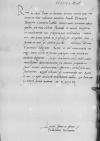List #3603
Łukasz GÓRKA do Ioannes DANTISCUSPiotrków, [1538]-03-02
| odebrano [1538]-03-11 Rękopiśmienne podstawy źródłowe:
| ||||
Tekst + aparat krytyczny + komentarz Zwykły tekst Tekst + komentarz Tekst + aparat krytyczny
Reverendissimo in Christo Patri et Domino, domino
Reverendissime in Christo Pater et Domine, domine amice carissime.
Domum hinc redeunte domino
Quod reliquum est, commendo me Reverendissimae Dominationi Vestrae et opto dudum incolumem valere.
Ex


 BCz, 1595, p. 836
BCz, 1595, p. 836